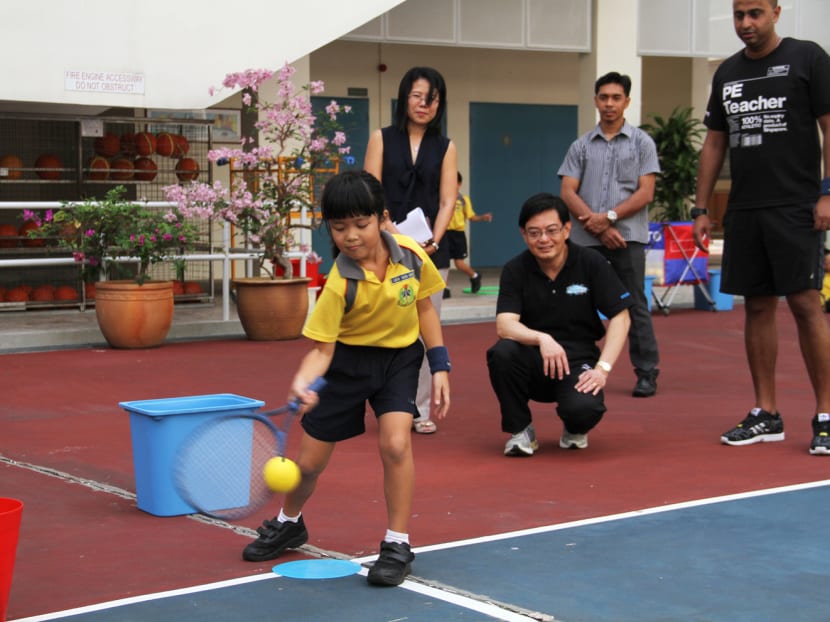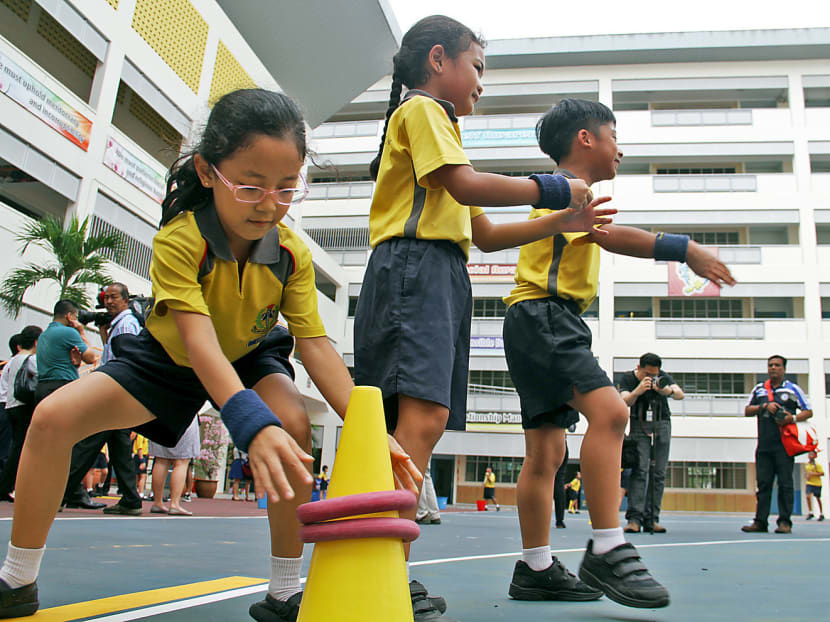Junior Sports Academy programme revised
SINGAPORE — From this year, pupils in primary schools will be selected from a younger age — at Primary Four, instead of Pri 5 — for the Ministry of Education’s (MOE) Junior Sports Academy (JSA) programme. And instead of selecting students using their performance in a particular sport, the programme will select them based on their general motor skills.


SINGAPORE — From this year, pupils in primary schools will be selected from a younger age — at Primary Four, instead of Pri 5 — for the Ministry of Education’s (MOE) Junior Sports Academy (JSA) programme. And instead of selecting students using their performance in a particular sport, the programme will select them based on their general motor skills.
Under the revised programme announced yesterday, participants will not specialise in a single sport, but be coached in four different sports. They will choose a sport from each of the four categories, which are divided based on skill sets and attributes required.
For example, badminton, table tennis and volleyball are grouped together, while gymnastics, track and field and wushu are placed in another category. Students will practise each sport once a week and take part in sports-related workshops.
The MOE plans to expand the sports offered to eventually comprise all 28 sports that are competed at the secondary school level.
Announcing the changes yesterday, Education Minister Heng Swee Keat said the revised programme provides a better way of developing talent. “We can better uncover talents and develop students fully regardless of their family background (and) starting point,” he said. “Students do not have to go to very specialised coaching lessons just to get the exposure, the schools will provide that foundation to allow them to do that.”
The JSA was introduced in 2008 with 1 per cent of each cohort, or around 400 students annually, participating in the programme. Over 2,200 students have since participated.
Parents TODAY spoke to welcomed the changes. Ms Marie Hwang, who has four sons, felt it might give those with a natural flair in physical activities, but who are not trained in a particular sport, a better chance at being selected for the programme.
Ms Josephine Yau, who had sent her daughter for extra track and field training outside of school, said the change will give students the opportunity to explore different sports at a young age. But she noted that children might still “prefer to (train) more for a particular sport that they are good in”.
Miss Teo Siew Lan, 65, a veteran volleyball coach at St Hilda’s Secondary School, supported the changes.
“The revisions will be beneficial because students at an early age sometimes do not know which sport they really have an aptitude and passion for, until they try,” she said. “Being introduced to up to four sports can sustain their interest and motivation ... A lot of them can (be) burnt out or lose motivation if they specialise too early.”
Miss Teo said the revised JSA programme bears some similarity to student-athletes in the United States and China of a similar age group, who also take part in two to three sports before identifying one to pursue further.
Referring to the Direct School Admissions programme (DSA), she felt that many parents would hope for their children to excel in a particular sport early so as to improve their chances of admission into their preferred secondary schools. She suggested that the JSA take in students even earlier, from Pri 2 or Pri 3, so they have time to specialise in one sport for the DSA.
However, Ms Kok Mun Wai, 45, a netball coach at CHIJ Kellock Primary, cautioned that the revisions could affect the development of elite athletes for schools and the country. “It must be careful not to be too broad in the sense that the student-athletes cannot grasp a sport and its basic rules right. I suppose this programme is taking a more recreational stance, rather than developing more elite athletes”.
The MOE said the programme is not targeted at grooming national athletes but to allow pupils to realise their strengths and make an informed choice to commit to one sport later at the secondary level.
Mr Ong Kim Soon, deputy director of the MOE’s physical and sports education branch, said: “If we get more national athletes, it’s a bonus, but the focus is on holistic development of these budding talents.”






